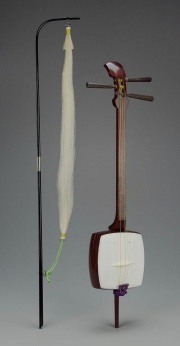Difference between revisions of "Sandalwood"
Jump to navigation
Jump to search
(username removed) |
(username removed) |
||
| Line 21: | Line 21: | ||
== Authority == | == Authority == | ||
| − | * | + | * G.S.Brady, ''Materials Handbook'', McGraw-Hill Book Co., New York, 1971 Comment: p. 689 |
| − | * | + | * Palmy Weigle, ''Ancient Dyes for Modern Weavers'', Watson-Guptill Publications, New York, 1974 |
| − | * | + | * F. H. Titmuss, ''Commercial Timbers of the World'', The Technical Press Ltd., London, 1965 |
| − | * | + | * Website address 1 Comment: "Violin Varnish Glossary" at www.violins.on.ca/luthier.vargloss.html |
[[Category:Materials database]] | [[Category:Materials database]] | ||
Revision as of 06:45, 24 July 2013
Description
A brick-red wood obtained from sandalwood trees (Pterocarpus santalinus; ) native to tropical Asia. Sandalwood has a fine-grain with a straight or wavy pattern. The wood has been used for making cabinets and violins. It is also sold in blocks or chips for dye preparation. Sandalwood dye contains santalin as the primary colorant. It is soluble in alcohol but not in water. The fugitive color has been used for textiles and for tanning leather. Similar water insoluble dyes are obtained from barwood, camwood, and narrawood.
Synonyms and Related Terms
Pterocarpus santalinus; red sandalwood; sanders wood; saunder's wood; santal wood; byakudan (Jap.); padauk; bois de santal (Fr.)
Other Properties
Dye is soluble in alcohol. Insoluble in water.
| Density | 55-65 ppcf |
|---|
Authority
- G.S.Brady, Materials Handbook, McGraw-Hill Book Co., New York, 1971 Comment: p. 689
- Palmy Weigle, Ancient Dyes for Modern Weavers, Watson-Guptill Publications, New York, 1974
- F. H. Titmuss, Commercial Timbers of the World, The Technical Press Ltd., London, 1965
- Website address 1 Comment: "Violin Varnish Glossary" at www.violins.on.ca/luthier.vargloss.html

